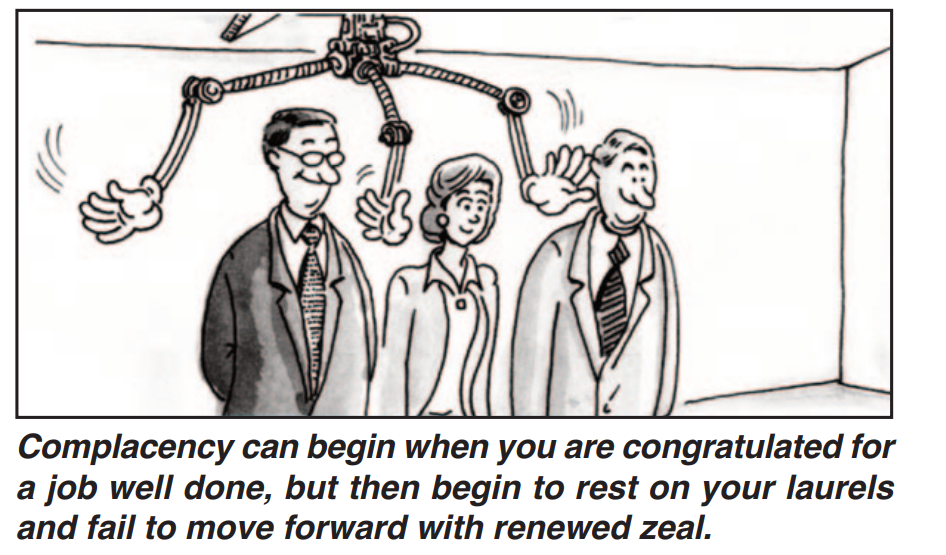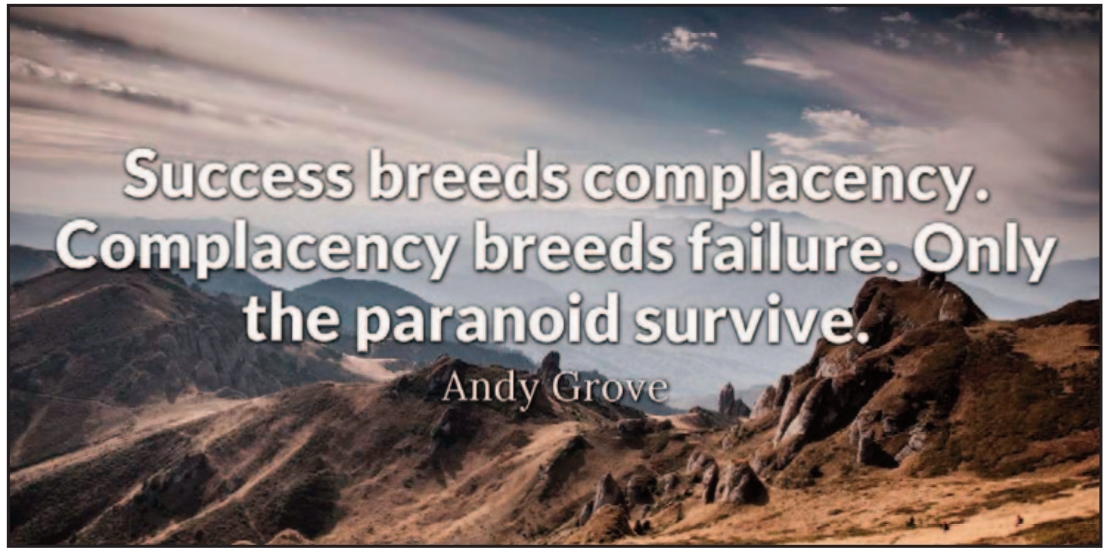
Complacency … the Enemy Within
Let It Not Gain a Foothold in Your Life!
We live in a world where ease and personal enjoyment are par for the course for so many. We Americans have been given such an abundance of things that it is easy for us to slip into an attitude of complacency that can greatly hinder our spiritual growth. Any of us can be a victim of this insidious evil if we are not careful. It is just one of many shortcomings that can creep up stealthily and entrap us into lethargy and discontent … which are qualities opposed to the spirit of God that dwells within us.
Complacency, a word not found as such in Scripture, can be defined as “a feeling of quiet pleasure or security, often while unaware of some potential danger, defect, or the like; self-satisfaction or smug satisfaction with an existing situation or condition.” This definition does not sound terribly evil, but let us take a close look at this attitude and see just how dangerous it is. First, let’s examine cases of complacency as they operate in the real world.
Example 1: Clay Shiver, former Florida State University All-American center and former center of the NFL Dallas Cowboys, starred as the only starter on the offense who wasn’t an All-Pro player. The team also had won three out of the last four Super Bowls. The year he started, the Cowboys posted a record of six wins and 10 losses. Shiver said he thought the reason for such a bad season was that the team had gotten complacent, had lost its hunger. He remembered being in the huddle where two All-Pro Super Bowl champions talked about how they couldn’t wait until the season was over so they could go on a fancy trip. They lost the next five games.
Example 2: Then there was the case of the Allied invasion at Normandy, called Operation Overlord, on June 6, 1944. The Nazis demonstrated sheer complacency while faced with the inevitable land invasion of occupied France. When the landing began no one in the German ranks thought the invasion was actually beginning. The tale goes that an entire force of Nazi Panzers was in reserve, just waiting to be unleashed on the invaders, but they could not move without express permission from the Fuehrer, Adolf Hitler. Where was the Fuehrer? He was sound asleep after taking a sedative the night before. His aides refused to rouse him out of fear of repercussions from this unpredictable dictator. This happened even though allied infantry were landing on the beaches! Some people say that was the single most expensive sleeping pill ever swallowed by a person.
Example 3: Let’s take an example from the Civil War. In April, 1862, the Army of Tennessee, commanded by Ulysses Grant, was encamped in Hardin County, Tennessee, in rugged and wooded terrain, with supplies coming into the army at Pittsburg Landing on the Tennessee River. The third division of his army, commanded by Major General Lew Wallace, was camped up the river; the rest were encamped to the west or south of the landing. The Confederate Army of the Mississippi, commanded by Albert Sidney Johnston, approached via narrow roads through the heavily forested area. Despite being detected by Federal patrols, nothing was done. The junior officers who commanded those patrols were accused of “seeing things,” and “jumping at shadows.” Johnston was considered by southerners to be their best general officer. He had a plan to push Grant’s army west, away from the river, and it almost worked. Some of the hottest fighting had been at what became known as “the Hornet’s Nest,” in which Federal troops held out for seven hours against repeated Confederate attacks. General Johnston died in that attack.
After the Hornet’s Nest and Johnston’s death, the command of the Confederate army was taken over by Pierre Gustave Toutant de Beauregard. The object had been to drive the Union force away from the river. Beauregard now launched headlong attacks against a demoralized and disorganized force, and in the process drove them toward the river. As the sun sank toward the horizon, two brigades launched attacks on the Federal line and were repulsed. Beauregard decided they had done enough for the day, and Confederate troops were ordered to stand down, and those who were not already busy looting the Federal camps tried to get some sleep for the night. They didn’t get much sleep. Federal gunboats in the river lobbed heavy shells at the former Federal camps all night. During the night the division of Lew Wallace, about 7,000 strong, arrived. More than 20,000 men from the Army of the Ohio also arrived and were ferried over the river during the night.
Beauregard had been warned that reinforcements were approaching, but he discounted the reports, and at one point even said the army had done enough that day. He never even looked at Grant’s line, remaining at Shiloh Meeting House, miles from the landing. With no effective supervision, rations were not issued, nor ammunition. The next morning, no attempt was made to re-assemble the army or to form a line, until Grant and Buell began the counterattack. Even then, Beauregard did not go to the front to observe; he waited until the Union attack reached his position with the reinforcements and Wallace’s division. The Confederate leaders’ idiotic performance, which wasted seven hours and thousands of casualties on attacks which should have succeeded in no more than three hours at the most, when combined with Beauregard’s complacency about the situation, doomed what had been a good plan to begin with, and which ought to have succeeded.
Many more examples of the fruits of complacency could be cited, but lets go to Scripture and see some examples. Notice first of all Amos 6:1-8.
“Woe to you who are at ease in Zion, and trust in Mount Samaria, notable persons in the chief nation, to whom the house of Israel comes! Go over to Calneh and see; and from there to Hamath the great; then go down to Gath of the Philistines. Are you better than these kingdoms: Or is their territory greater than your territory? Woe to you who put far off the day of doom, who cause the seat of violence to come near; who lie on beds of ivory, stretch out on your couches, eat lambs from the flock and calves from the midst of the stall; who sing idly to the sound of stringed instruments, and invent for yourselves musical instruments like David; who drink wine from bowls, and anoint yourselves with the best ointments, but are not grieved for the affliction of Joseph. Therefore they shall now go captive as the first of the captives, and those who recline at banquets shall be removed. The Lord God has sworn by Himself, the Lord God of hosts says: ‘I abhor the pride of Jacob, and hate his palaces; therefore I will deliver up the city and all that is in it.’”

Ease and Plenty Can Be Culprits
(1) Complacency and fatness. We can find many places in Scripture where wealth and ease, and in particular fatness of body, can be equated with complacency. Here are several examples.
Deuteronomy 31:20. “When I have brought them to the land flowing with milk and honey, of which I swore to their fathers, and they have eaten and filled themselves and grown fat, then they will turn to other gods and serve them; and they will provoke Me and break My covenant.”
fat = dashen, “to thrive and grow fat, be satisfied and prosper.”
Deuteronomy 32:14-15. “Curds from the cattle, and milk of the flock, with fat of lambs; and rams of the breed of Bashan, and goats, with the choicest wheat; and you drank wine, the blood of the grapes. But Jeshurun grew fat and kicked; you grew fat, you grew thick, you are obese! Then he forsook God who made him, and scornfully esteemed the Rock of his salvation.”
fat = shaman, “to shine, i.e., be oily and gross.”
Nehemiah 9:25-26. “And they took strong cities and a rich land, and possessed houses full of all goods, cisterns already dug, vineyards, olive groves, and fruit trees in abundance. So they ate and were filled and grew fat [shaman], and delighted themselves in Your great goodness. Nevertheless they were disobedient and rebelled against You, cast Your law behind their backs and killed Your prophets, who testified against them to turn them to Yourself; and they worked great provocations.”


Hosea 13:6. “When they had pasture, they were filled; they were filled and their heart was exalted; therefore they forgot Me.”
filled = sabeay, “to sate, fill to satisfaction.”
Psalm 17:10. “They have closed up their fat hearts; with their mouths they speak proudly.”
fat = cheleb, “callous, a heart that is dull and unresponsive.”
Job 15:27-28. “Though he has covered his face with his fatness, and made his waist heavy with fat, he dwells in desolate cities, in houses which no one inhabits, which are destined to become ruins.”
fat = piymah, “plump, obese.”
We can see in all of these citations that fatness is directly related to a self-centered attitude, wherein an abundance of material things is coupled with plenty of food — even an excess — and consequential forgetting of the laws and character of God. The people slip into the concerns that the rich and well-fed are known for, even today: jealousy, covetousness, selfishness, pride, and greed … for the human heart apart from its Creator can never be satisfied, and is desperately wicked (Jeremiah 17:9).
(2) Complacency and sloth. A word closely related to complacent is slothful, sometimes translated lazy. This term is cited numerous times in Scripture, especially in Proverbs, a sampling of which is given below.
Proverbs 12:24. “The hand of the diligent will rule, but the lazy man will be put to forced labor.”
lazy = rmiyah “deceitful, false, guile, idle, slack, slothful.”
Proverbs 12:27. “The lazy [rmiych] man does not roast what he took in hunting, but diligence is man’s precious possession.”
Proverbs 15:19. “The way of the lazy man is like a hedge of thorns, but the way of the upright is a highway.”
lazy = atsel, “slothful, sluggard.”
Proverbs 18:9. “He who is slothful in his work is a brother to him who is a great destroyer.”
slothful = raphah, “to slacken.”
Proverbs 19:24.”A lazy [atsel] man buries his hand in the bowl, and will not so much as bring it to his mouth again.”
Proverbs 21:25. “The desire of the lazy [atsel] man kills him, for his hands refuse to labor.”
Proverbs 22:13. “The lazy [atsel] man says, ‘There is a lion outside! I shall be slain in the streets!’”
Proverbs 24:30-34. “I went by the field of the lazy man, and by the vineyard of the man devoid of understanding; and there it was, all overgrown with thorns; its surface was covered with nettles; its stone wall was broken down. When I saw it, I considered it well; I looked on it and received instruction: A little sleep, a little slumber, a little folding of the hands to rest; so shall your poverty come like a prowler, and your need like an armed man.”
lazy = iysh, “a man.”
Matthew 25:26. “But his lord answered and said to him, ‘You wicked and lazy servant, you knew that I reap where I have not sown, and gather where I have not scattered seed.”
lazy = okneros, “tardy, indolent.”
Romans 12:11. “Not slothful [okneros] in business, fervent in spirit; serving the Lord….”
slothful = (see above).
Hebrews 5:11.”of whom we have much to say, and hard to explain, since you have become dull of hearing.”
dull = nothros, “sluggish, lazy, stupid.”
Hebrews 6:12. “That you be not slothful [nothros], but followers of them who through faith and patience inherit the promises.”
Complacency, the Enemy of Success
Even people in the world identify complacency as being the enemy of success, especially in the business world. Take Frank Sonnenberg (www.franksonnenbergonline.com), for instance, a highly respected advisor to companies for sound and successful business management. He lists several warning signs that show you are becoming complacent, and these points can be applied directly to our spiritual lives. In fact, he calls complacency “the silent killer.”
“You’ve worked hard to achieve success. You’ve struggled through hard times, you’ve met challenges head on, and you’ve fought the hard battles. You’ve finally reached the pinnacle of success. But you’re about to face your toughest challenge yet — complacency. Achieving success is hard; staying successful is even harder.
“Are you in danger of becoming complacent? Here are eight warning signs that signal trouble ahead for you or your business.
[Note: I have added Scriptural confirmation for each point.]
1. You take success for granted. Some folks become complacent and coast. They fool themselves into believing that their comfortable lead can’t be lost (vs. Joshua 1:5-9).
2. You lose focus. Some folks abandon the things that made them successful. They drift away from what they know and do best (vs. Hebrews 3:1).
3. You fail to learn. Some folks are so busy celebrating success they fail to notice that the world around them is changing — and they’re not keeping up with the times (vs. II Peter 3:18).
4. You stop listening. Some folks let success go to their head. They think they know everything — and no one has the courage to tell them otherwise (vs. John 8:47).
5. You fight for attention. Some folks forget that success was a team effort and try to steal the spotlight. This causes ill will and resentment among all the team members (vs. James 3:14-16).
6. You go on defense. Some folks go on defense thinking the ‘game’ is already won. They react to situations rather than pursuing opportunities (vs. Philippians 3:13-14).
7. You lose sense of pride. Some folks lose their passion and get careless (vs. Colossians 3:23-24).
8. You believe in a sense of entitlement. Some folks believe past success guarantees future success. They want the rewards without the hard work (vs. Ecclesiastes 9:10; 11:6).”

Clark Gaither writes in the Good Men Project [www.goodmenproject.com] that
“Just like the Law of Entropy which states systems and matter tend to go from an organized state to one of disorganization and randomness, people can go from a highly adaptable prevailing state of dissatisfaction to abject complacency if they are not perpetually diligent. You might say, wait a minute. Who lives perpetually dissatisfied? Who would want to? It’s a fair question. I’ll tell you who — artists, innovators, entrepreneurs, writers, engineers, designers, singers, actors, CEO’s, musicians, and athletes, just to name a few. [Let us add Christians to this list.] To pursue excellence is to be perpetually dissatisfied with the status quo. Complacency is the end of life as you could have known it. Complacency is the lethal enemy of excellence.
“Complacency is the end of life as you could have known it. How is it, then, so many people sit down in life and accept the comfortable misery of variations in sameness? There are many reasons. Here is an unvarnished, non-PC listing of the seven most common ones.
1. Self-imposed Limitations. The belief you are not good enough or capable. Keywords: “I can’t.”
2. Laziness. Attempting to become content in life looks too much like hard work. Keywords: “I won’t.”
3. Comfortable Misery. Change is feared or considered more painful or difficult than staying put. Keyword: “Slave (to the status quo).”
4. Boredom. A state is reached where the sense of wonder and curiosity has been lost. Keywords: “Brain death.”
5. False Sense of Security and Well-Being. The mistaken notion that since nothing bad has happened, it never will, so I can relax and let my guard down. Keyword: “Delusional.”
6. Inactivity. A continuous state of feeling too tired to exercise regularly. Keywords: “Couch potato.”
7. Inattentiveness. We see what we wish to see rather than what is glaringly apparent to everyone else. Keyword: “Fool.”

Complacency Does Not Equal Contentment!
Let’s be clear: complacency does not mean the same as contentment. The Apostle Paul made that plain in three of his letters.
Philippians 4:11-12. “Not that I speak in regard to need, for I have learned in whatever state I am to be content: I know how to be abased, and I know how to abound. Everywhere and in all things I have learned both to be full and to be hungry, both to abound and to suffer need.”
content = autarkos, “sufficient or adequate in one’s self, contented with one’s lot.”
I Timothy 6:8 “And having food and clothing, with these we shall be content.”
content = arkeo, “to suffice, be enough.”
Hebrews 13:5 “Let your conduct be without covetousness; be content [arkeo] with such things as you have. For He Himself has said, ‘I will never leave you nor forsake you.’”
John the Baptist also told soldiers to be content [arkeo] with their wages in Luke 3:14. Yes, contentment is vital in our Christian walk, but does this imply we are to hold back and not keep progressing in life? Notice what Paul says in Philippians 3:12-16.
“Not that I have already attained, or am already perfected; but I press on, that I may lay hold of that for which Christ Jesus has also laid hold of me. Brethren, I do not count myself to have apprehended; but one thing I do, forgetting those things which are behind and reaching forward to those things which are ahead, I press toward the goal for the prize of the upward call of God in Christ Jesus. Therefore let us, as many as are mature, have this mind; and if in anything you think otherwise, God will reveal even this to you. Nevertheless, to the degree that we have already attained, let us walk by the same rule, let us be of the same mind.”
reaching forward = epekteinomai, “to stretch out farther, to reach out towards, strain for.”
In other words, we are not to cease growing towards the fullness of the stature of Christ (Ephesians 4:13), but we must always possess a certain level of dissatisfaction with ourselves in our current state. We can never become sedate in our current situation, but always be reaching forward to overcome our personal self-centered nature — which requires great endurance … for “… he that endures to the end [of this evil age] shall be saved” (Matthew 24:13). We can never let up in the quest to be with Jesus Christ and our heavenly Father in the resurrection.
Overcoming Complacency
As Clark Gaither says, “Recognizing complacency is one thing. Doing something about it is quite another. It isn’t just a matter of doing the exact opposite of all that causes complacency. It has more to do with adopting a certain lifestyle, a certain attitude. One in which the status quo is hell, and pushing the boundaries of excellence is a stairway to heaven.”
Gaither may not have been thinking of heaven in the same context as we are here, but we are literally fighting complacency as a means to achieve the heavenly reward to which we were called! Lifestyle is indeed the key — the lifestyle and character of Jesus Christ placed within us — and as already mentioned, growth is the key. The God who authored the Bible states that “… of the increase of His government and of peace there will be no end” (Isaiah 9:7). Increase is inherent within the realm of our great Creator God. Notice what Scripture tells us.
Luke 9:62. “But Jesus said to him, ‘No one, having put his hand to the plow, and looking back, is fit for the kingdom of God.’”
I Corinthians 9:24-26. “Do you not know that those who run in a race all run, but one receives the prize? Run in such a way that you may obtain it. And everyone who competes for the prize is temperate in all things. Now they do it to obtain a perishable crown, but we for an imperishable. Therefore I run thus, not with uncertainty. Thus I fight, not as one who beats the air.”
Hebrews 6:1 “Therefore, leaving the discussion of the elementary principles of Christ, let us go on to perfection, not laying again the foundation of repentance from dead works and of faith toward God.”
Ephesians 4:13. “… till we all come to the unity of the faith and of the knowledge of the Son of God, to a perfect man, to the measure of the stature of the fullness of Christ.”
Colossians 1:28. “Him we preach, warning every man and teaching every man in all wisdom, that we may present every man perfect in Christ Jesus.”
Many scriptures tell us to keep growing unto perfection, better rendered by the word maturity. The following is a sampling of these verses.
Matthew 5:48. “Therefore you shall be perfect, just as your Father in heaven is perfect.”
perfect = teleios, “complete, as in growth, mental and moral character.”
Ezekiel 28:15 “You were perfect in your ways from the day you were created, till iniquity was found in you.”
perfect = tamiym, “entire (literally, figuratively, or morally), integrity, truth.”
Matthew 19:21. “Jesus said to Him, ‘If you want to be perfect [teleios], go, sell what you have and give to the poor, and you will have treasure in heaven; and come, follow Me.’”
John 17:23. “I in them, and You in Me; that they may be made perfect in one, and that the world may know that You have sent Me, and have loved them as You have loved Me.”
perfect = teleloo, “complete, consummate (in character); from teleios.”
I Corinthians 2:6. “However, we speak wisdom among those who are perfect [teleios], yet not the wisdom of this age, nor of the rulers of this age, who are coming to nothing.”
II Corinthians 13:11. “Finally, brethren, farewell. Become perfect. Be of good comfort, be of one mind, live in peace; and the God of love and peace will be with you.”
perfect = katartizo, “to complete thoroughly.”
The word teleios or teleioo are used in Ephesians 4:12, Colossians 1:28 and 4:12, Hebrews 12:23, and James 3:2, whereas the word katartizo is used in Hebrews 13:21 and I Peter 5:10. The Greek word artios, meaning “fresh and complete,” is used in II Timothy 3:17.

What Must We Do?
Motivational teachers give a number of suggestions for overcoming complacency, such as those promoted by Frank Sonnenberg. All of these points have direct spiritual application; I have added some Scriptures to these points.
“1. Don’t let your guard down. Give yourself a kick in the butt. If you’re not up to the job, find someone who is [Luke 21:34-36].
2. Stay grounded. Remember what made you successful and what you’ve learned along the way [II Timothy 2:15].
3. Create stretch goals. Push your limits. Set ambitious yet realistic goals. Challenge everyone to do better and to be better. The fact is, if you spend your life coasting, it’ll all be downhill [Hebrews 10:24-25].
4. Don’t be a know-it-all. Know what you know and what you don’t know. It’s strength, not weakness, to seek advice from others [Proverbs 11:14; 15:22; 24:6].
5. Welcome fresh ideas. Invite fresh new thinking that challenges your perspective. The truth is, surrounding yourself with yes people is like talking to yourself [II Corinthians 5:17].
6. Learn from the best. Never stop growing Identify best practices, and make sure to implement them [John 5:19; Deuteronomy 6:1-2; 8:1].
7. Compete with yourself. View success as a journey rather than as a destination. Focus on beating your best rather than your competition. That way you’ll always be growing and learning from the best in the field — yourself Corinthians 9:27; Matthew 20:15-16; 25:34-40.
8. Fight against routine. Embrace change. If it ain’t broke, break it [II Corinthians 5:17; Ephesians 4:22-24].
9. Look for areas of vulnerability. Ask ‘what-if’ questions to uncover blind spots. Find the cracks in your system [Psalm 19:12].
10. Never underestimate the opposition [Luke 22:31].
11. Wake up. Any military strategist will tell you that underestimating the enemy is courting defeat [I Peter 5:8-9].
12. Maintain momentum. Don’t let up. As soon as you achieve one goal, set another. It’s easier to maintain momentum than to rebuild it once it’s lost [Proverbs 4:25; Philippians 3:12-13].
13. Look to the future (not the past). Take the time to smell the roses, but don’t spend too much time basking in the glory of success. As Andrew Grove, former CEO of Intel, said, ‘Success breeds complacency. Complacency breeds failure. Only the paranoid survive [Hebrews 12:1].’”
As good as this advice is, the Scriptures give us sound advice for combatting complacency from the hand of God Himself. Paul stated in Romans 1:20 that, “The invisible things of Him from the creation of the world are clearly seen, being understood by the things that are made,” which indicates that the natural created world can teach us a great deal about God’s truth if we will but look.
How about ants? Proverbs 6:6-8 states, “Go to the ant, you sluggard, consider her ways and be wise, which having no guide, overseer, or ruler provides her meat in the summer, and gathers her food in the harvest.” Proverbs 30:25-28 extends the wisdom of ants to conies, locusts, and spiders! So what do ants teach us?
- Ants never, ever give up. Put something in front of them, and they will get around it, over it, under it, or through it. If one way doesn’t work, they will try another. If that way does not work, they will try still another way … and so on until they find a way around the obstacle.
- Ants are always getting ready for what’s next. They don’t ever rest on their laurels. In the summer, they are thinking about the winter and getting ready for it.
- Ants are creatively industrious and resourceful. Ants don’t complain about not having the right tools to do what needs to be done. They take what is available right in front of them and find a way to make it work.
- Ants are always hopeful. In the winter, when they are holed up in their little ant mound, they are using what they stored up all summer and know that, as long as it is, summer is coming, and they are getting ready for it.
- Ants don’t seem to believe in the concept of enough. They store up all that they can for the winter.

Solutions from Amos
Just as ancient Israel was castigated for its complacency in Amos (as in Amos 6:3-6), so the Eternal gave Israel the remedy in the same book. The richer Israelites had been experiencing considerable prosperity and forgotten to love their neighbors, and on the other hand the poor were so overwhelmed, tired, and confused by the pressures of daily living that they gave up hope of anything changing. Both the rich and the poor had become complacent. There are few references to a bright future for Israel — only calamity and destruction because of their sins — and few corrective statements. Then Amos concludes chapter 9 with the hope of a renewed nation and a new world. Read what Amos says.
Amos 5:6. “Seek the Lord and live, lest He break out like fire in the house of Joseph, and devour it, with no one to quench it in Bethel.”
Amos 5:14-15. “Seek good and not evil, that you may live; so the Lord God of hosts will be with you, as you have spoken. Hate evil, do good; establish justice in the gate. It may be that the Lord God of hosts will be gracious to the remnant of Joseph.”
Amos 5:24. “… but let justice rain down like water, and righteousness like a mighty stream.”
Amos 9:11-15. “On that day I will raise up the tabernacle of David, which has fallen down, and repair its damages; I will raise up its ruins, and rebuild it as in the days of old; that they may possess the remnant of Edom, and all the Gentiles who are called by My name, says the Lord who does this thing. Behold, the days are coming, says the Lord, when the plowman shall overtake the reaper, and the treader of grapes him who sows seed; the mountains shall drip with sweet wine, and all the hills shall flow with it. I will bring back the captives of My people Israel; they shall build the waste cities and inhabit them; they shall plant vineyards and drink wine from them; they shall also make gardens and eat fruit from them. I will plant them in their land, and no longer shall they be pulled up from the land I have given them, says the Lord your God.”
The key to correcting the complacency within Israel is plain in just a few words: seek Yahweh, do good, hate evil, establish justice, live righteously. Few words, yes, but powerful ones. Are they the answer to reversing complacency? Yes, but only if they are done! As Micah 6:8 says, “He has shown you, O man, what is good; and what does the Lord require of you, but to do justly, to love mercy, and to walk humbly with your God”?
The books of Isaiah, Jeremiah, Ezekiel, and several of the Minor Prophets mirror the messages of Amos: obey the Eternal and forsake evil. That will put complacency to flight.
The Conclusion
There are additional things a person can do to avoid complacency, and that includes gaining health and energy through proper diet, exercise, and frame of mind. Fatigue from sickness and improper lifestyle can lead to complacency, whereas exuberant energy, as Jesus Christ’s way encourages, leads to abundant life (John 10:10). It is critical that we have a mind set on serving the Eternal, for that attitude ensures that we will not waver along the pathway of life, but we will agree with Solomon when he said, “Let us hear the conclusion the matter: Fear God and keep the commandments, for this is man’s all” (Ecclesiastes 12:13).
Control complacency before it controls you! Wherever you find success you’ll find complacency, but you have the ability to control your situation — if you have the will and desire. It takes so much to become successful in living the Christian walk, so why bring yourself down? As Benjamin E. Mays, the minister and educator from South Carolina, once said, “The tragedy of life is often not in our failure, but rather in our complacency; not in our doing too much, but rather in our doing too little; not in our living above our ability, but rather in our living below our capacities.”
Complacency is the enemy of Christian living. It is the opposite of life, akin to death. For us who are walking in the footsteps of Jesus Christ it must find no resting place, and when we see it in ourselves we must take immediate action to rid ourselves of it. Here are the words of an anonymous author.
“Complacency is a blight that saps energy, dulls attitudes, and causes a drain on the brain. The first symptom is satisfaction with things as they are. The second is rejection of things as they might be. ‘Good enough’ becomes today’s watchword and tomorrow’s standard. Complacency makes people fear the unknown, mistrust the untried, and abhor the new. Like water, complacent people follow the easiest course — downhill. They draw false strength from looking back.”

